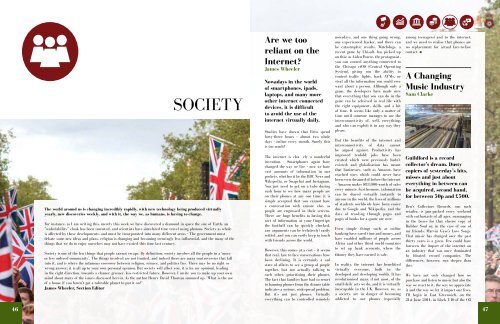The Future of Britain
You also want an ePaper? Increase the reach of your titles
YUMPU automatically turns print PDFs into web optimized ePapers that Google loves.
SOCIETY<br />
<strong>The</strong> world around us is changing incredibly rapidly, with new technology being produced virtually<br />
yearly, new discoveries weekly, and with it, the way we, as humans, is having to change.<br />
For instance, as I am writing this, merely this week we have discovered a diamond in space the size <strong>of</strong> Earth, an<br />
“unfeelability” cloak has been invented, and scientists have simulated time travel using photons. Society as whole<br />
is affected by these developments, and must be incorporated into many different areas – <strong>The</strong> government must<br />
debate some new ideas and plans, religion is changing and becoming seemingly less influential, and the many <strong>of</strong> the<br />
things that we do to enjoy ourselves may not have existed this time last century.<br />
Society is one <strong>of</strong> the few things that people cannot escape. By definition, society involves all the people in a ‘more<br />
or less ordered community’. <strong>The</strong> things involved are not limited, and indeed there are many controversies that fall<br />
into it, and is where the infamous crossover between religion, science, and politics lies. <strong>The</strong>re may be no right or<br />
wrong answer; it is all up to your own personal opinion. But society will affect you, it is (in my opinion), leading<br />
in the right direction, towards a cleaner, greener, less restricted future. However, I invite you to make up your own<br />
mind about many <strong>of</strong> the issues discussed herein. As the author Henry David Thoreau summed up, ‘What is the use<br />
<strong>of</strong> a house if you haven’t got a tolerable planet to put it on?’<br />
James Wheeler, Section Editor<br />
Are we too<br />
reliant on the<br />
Internet?<br />
James Wheeler<br />
Nowadays in the world<br />
<strong>of</strong> smartphones, ipads,<br />
laptops, and many more<br />
other internet-connected<br />
devices, it is difficult<br />
to avoid the use <strong>of</strong> the<br />
internet virtually daily.<br />
Studies have shown that Brits spend<br />
forty-three hours – almost two whole<br />
days – online every month. Surely this<br />
is too much?<br />
<strong>The</strong> internet is clea rly a wonderful<br />
invention. Smartphones again have<br />
changed the way we live – now we have<br />
vast amounts <strong>of</strong> information in our<br />
pockets, whether it be the BBC News and<br />
Wikipedia, or Snapchat and Instagram.<br />
You just need to get on a tube during<br />
rush hour to see how many people are<br />
on their phones at any one time: it is<br />
simply accepted that you cannot have<br />
a conversation with anyone else, as<br />
people are engrossed in their screens.<br />
<strong>The</strong>re are huge benefits to having this<br />
sort <strong>of</strong> information at your fingertips:<br />
the football can be quickly checked,<br />
any arguments can be (relatively) easily<br />
settled, and you can easily keep in touch<br />
with friends across the world.<br />
However, this comes at a cost – it seems<br />
that real, face to face conversations have<br />
been declining. It is certainly a sad<br />
state <strong>of</strong> affairs to see a group <strong>of</strong> people<br />
together, but not actually talking to<br />
each other, prioritising their phones.<br />
<strong>The</strong> fact that families have had to resort<br />
to banning phones from the dinner table<br />
indicates a serious, widespread problem.<br />
But it’s not just phones. Virtually<br />
everything can be controlled remotely<br />
nowadays, and one thing going wrong,<br />
one experienced hacker, and there can<br />
be catastrophic results. Watchdogs, a<br />
recent game by Ubis<strong>of</strong>t, has picked up<br />
on this: as Aiden Pearce, the protagonist,<br />
you can control anything connected to<br />
the Chicago ctOS (Central Operating<br />
System), giving you the ability to<br />
control traffic lights, hack ATMs, or<br />
steal all the information you could ever<br />
want about a person. Although only a<br />
game, the developers have made sure<br />
that everything that you can do in the<br />
game can be achieved in real life with<br />
the right equipment, skills, and a bit<br />
<strong>of</strong> time. It seems like only a matter <strong>of</strong><br />
time until someone manages to use the<br />
interconnectivity <strong>of</strong>, well, everything,<br />
and who can exploit it in any way they<br />
please.<br />
But the benefits <strong>of</strong> the internet and<br />
interconnectivity <strong>of</strong> data cannot<br />
be argued against. Productivity has<br />
improved tenfold; jobs have been<br />
created which were previously hadn’t<br />
existed; and globalisation has meant<br />
that businesses, such as Amazon, have<br />
reached sizes which could never have<br />
been even dreamed <strong>of</strong> before the internet<br />
– Amazon makes $83,000-worth <strong>of</strong> sales<br />
every minute. Furthermore, information<br />
can be shared virtually instantly to<br />
anyone in the world; the lives <strong>of</strong> millions<br />
<strong>of</strong> students worldwide have been easier<br />
due to Google and Wikipedia, and the<br />
days <strong>of</strong> trawling through pages and<br />
pages <strong>of</strong> books for a quote are over.<br />
Even simple things such as online<br />
banking have saved time and money, and<br />
have enabled millions <strong>of</strong> people across<br />
Africa and other third world countries<br />
to set up bank accounts, where the<br />
money they have earned is safe.<br />
In reality, the internet has benefitted<br />
virtually everyone, both in the<br />
developed and developing worlds. It has<br />
revolutionised many, if not most, <strong>of</strong> the<br />
small daily acts we do, and it is virtually<br />
inescapable in the UK. However, we, as<br />
a society, are in danger <strong>of</strong> becoming<br />
addicted to our phones (especially<br />
among teenagers) and to the internet,<br />
and we need to realise that phones are<br />
no replacement for actual face-to-face<br />
contact. ƒ<br />
A Changing<br />
Music Industry<br />
Sam Clarke<br />
Guildford is a record<br />
collector’s dream. Dusty<br />
copiers <strong>of</strong> yesterday’s hits,<br />
misses and just about<br />
everything in between can<br />
be acquired, second hand,<br />
for between 50p and £500.<br />
Ben’s Collectors Records, one such<br />
retailer, is jam-packed every weekend<br />
with enthusiasts <strong>of</strong> all ages, rummaging<br />
in the boxes for that elusive copy <strong>of</strong><br />
Rubber Soul or, in the case <strong>of</strong> one <strong>of</strong><br />
my friends, Marvin Gaye’s Love Songs.<br />
That music has changed over the past<br />
thirty years is a given. Few could have<br />
foreseen the impact <strong>of</strong> the internet on<br />
an industry that was once dominated<br />
by bloated record companies. <strong>The</strong><br />
differences, however, run deeper than<br />
this.<br />
We have not only changed how we<br />
purchase and listen to music but also the<br />
way we react to it, the way we appreciate<br />
it and the way we let it impact our lives.<br />
I’ll begin in East Greenwich, on the<br />
21st June 2014, in block U10 <strong>of</strong> the O2<br />
46<br />
47




